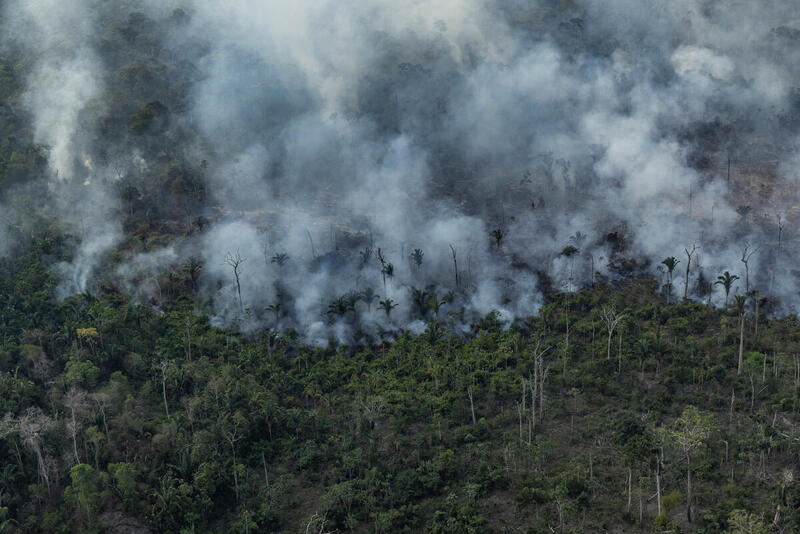It is time for us, Amazonians, to show that we know how to take care of Brazil’s greatest treasure.
The increase in deforestation in the Amazon to immoral levels since 2019 has stimulated the creation of several forums, groups, and initiatives in Brazil to discuss solutions for the region. However, a frequent reflection I hear (and also do) is about the absence or the low number of Amazonian participants in such spaces.
This is a legitimate concern for all those, like me, who were born and live in the region. Many of the recommendations for improved public services and sustainable business that come out of these discussions will depend on the engagement of the local population and need to consider the reality of who lives here.

In this second semester of 2022, all Amazonians have a concrete opportunity to change this lack of participation in discussions about our region and show the value of our contribution: let’s elect representatives for the National Congress and the State legislature committed to sustainable development in the Amazonian states! Electing pro-sustainability legislators is the most significant contribution we, Amazonians, can make now in our lives.
The next four years will be crucial in determining whether Brazil can meet its target to reduce greenhouse gas emissions by 2030.
Reducing deforestation, or rather, zero deforestation is an essential part of this climate commitment since it accounts for the largest share of Brazilian emissions. But what is the relationship between meeting this target and electing a pro-sustainability parliamentary bench in the Amazon?
Since I started writing columns at PlenaMata, I have addressed several examples of bills in the National Congress and new laws passed in state legislatures in the Amazon that can generate more destruction of our forests. This is the case, for example, of the bills on land grabbing or on environmental (un)licensing. At the state level, there was the state law to reduce conservation units in Rondônia, which fortunately was later reversed by the judiciary.
It is also worth listening to the Tempo Quente Podcast, in which journalist Giovana Girardi analyzes several cases of laws passed in the last decade that negatively impact climate policies in Brazil.
So if we elect congress members who pass anti-environmental laws, our chance of meeting climate targets will get smaller and smaller.
I know the Executive Power has significant weight in deconstructing environmental policies and institutions that we have witnessed in the country in the last three years. But besides electing pro-environmental president and governors, we need our congressional seats at the federal and state levels in the region to be compatible with the confrontation of the climate emergency that we are experiencing.
And how do you know if a candidate will not play against the environment? Some initiatives can help in this assessment. For example, suppose you intend to vote to reelect someone currently occupying a seat in the National Congress. In that case, some analyses indicate how the current members of Congress voted on bills that affect the environmental agenda. It is the case of the Monitor do Congresso, from the website ((o)) eco. It analyzes the voting of five proposals harmful to the environment approved by the House of Representatives.
This August, the Painel Farol Verde will also be launched. In addition to evaluating this type of vote, it will show the results of a survey on socio-environmental issues with candidates running for reelection in the federal parliament. This is an initiative of the Democracy and Sustainability Institute (IDS), in partnership with the Socio-environmental Working Group of the Collaborative Advocacy Network (RAC) and several socio-environmental organizations.
There is also the Indigenous Campaign of the Articulation of the Indigenous Peoples of Brazil (Apib), gathering information from indigenous candidates all over the country.
But if you intend to vote for someone who has not yet held positions in the legislature or has not found this kind of assessment for the state level, it is worth remembering that we are in the age of social networks. Use your power of speech and question candidates on their profiles about issues such as the demarcation of indigenous lands, deforestation in the Amazon, and destruction of equipment used in the practice of environmental crimes to give a few examples. Do this even if your candidate is not active on the environmental issue. After all, if elected, he or she will have to vote on various matters.
It is the time for us, Amazonians, to show that we know how to take care of the greatest Brazilian treasure. Let’s elect pro-sustainability candidates in the Amazon and, afterward, monitor and demand that the elected parliamentarians act in a way compatible with the conservation and well-being of the region’s population.
The opinions expressed in this article are the writer’s own.


